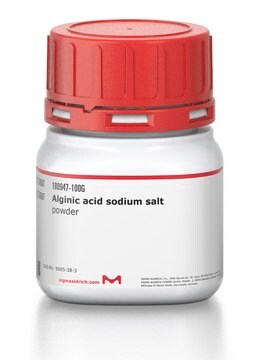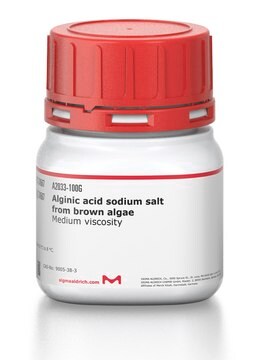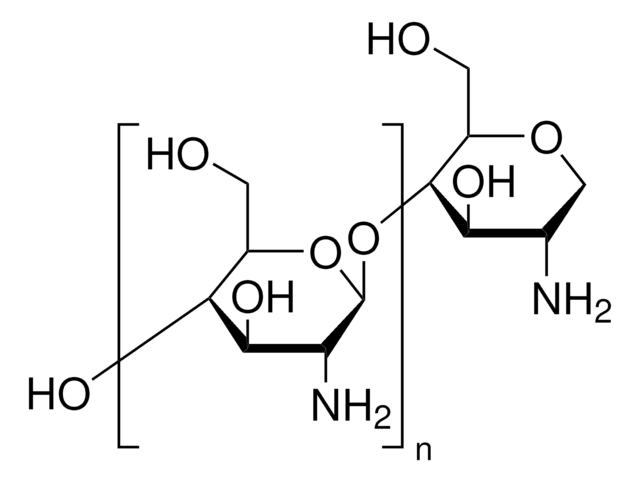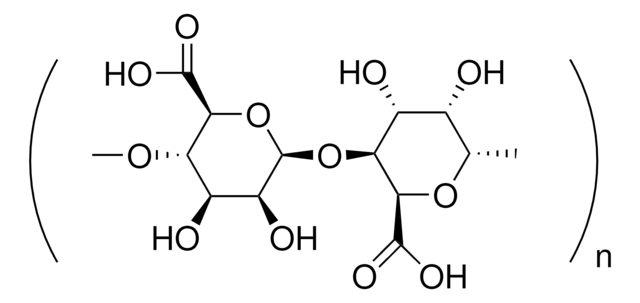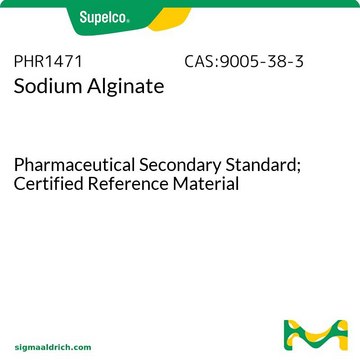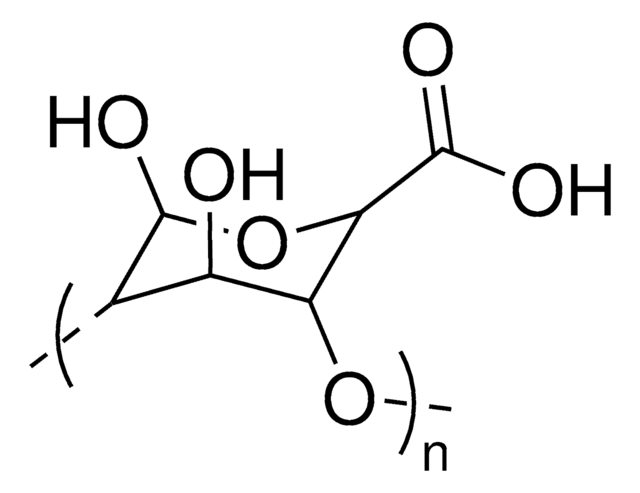A1603
Alginate Lyase
powder, ≥10,000 units/g solid
Synonyme(s) :
poly-beta-D-mannuronate lyase
Se connecterpour consulter vos tarifs contractuels et ceux de votre entreprise/organisme
About This Item
Numéro CAS:
Numéro MDL:
Code UNSPSC :
12352204
Nomenclature NACRES :
NA.54
Produits recommandés
Description générale
Alginate lyases is present in several marine algae, marine mollusks and a vast range of marine and terrestrial bacteria.
Application
Alginate Lyase has been used:
- in the pre-processing of enzyme
- to de-encapsulate cells
- to digest Pseudomonas exopolysaccharide to facilitate electroporation
Alginate Lyase is used to break down alginate or alginic acid and to reduce viscosity. It is useful during follicle isolation, encapsulation, and culture .
Actions biochimiques/physiologiques
Alginate lyases actively participates in the saccharification of the acidic polysaccharides for the production of bioethanol.
Breaks down alginate or alginic acid to smaller molecules and reduces viscosity.
Définition de l'unité
One unit will produce an increase the A235nm of 1.0 per minute per mL of sodium alginate solution at pH 6.3 at 37 °C
Notes préparatoires
Add 0.15 mI of enzyme solution (1 un/ml) to 4.5 ml of 0.1% sodium alginate (pH 6.3). Incubate at 37 °C for 30 minutes. Terminate reaction by addition of 4.65 ml of 0.1 N NaOH.
Autres remarques
View more information on enzymes for complex carbohydrate analysis at www.sigma-aldrich.com/enzymeexplorer
Mention d'avertissement
Danger
Mentions de danger
Conseils de prudence
Classification des risques
Resp. Sens. 1
Code de la classe de stockage
11 - Combustible Solids
Classe de danger pour l'eau (WGK)
WGK 1
Point d'éclair (°F)
Not applicable
Point d'éclair (°C)
Not applicable
Équipement de protection individuelle
Eyeshields, Gloves, type N95 (US)
Faites votre choix parmi les versions les plus récentes :
Certificats d'analyse (COA)
Lot/Batch Number
Vous ne trouvez pas la bonne version ?
Si vous avez besoin d'une version particulière, vous pouvez rechercher un certificat spécifique par le numéro de lot.
Déjà en possession de ce produit ?
Retrouvez la documentation relative aux produits que vous avez récemment achetés dans la Bibliothèque de documents.
Les clients ont également consulté
W Hashimoto et al.
Journal of bacteriology, 182(16), 4572-4577 (2000-07-27)
A bacterium, Sphingomonas sp. strain A1, can incorporate alginate into cells through a novel ABC (ATP-binding cassette) transporter system specific to the macromolecule. The transported alginate is depolymerized to di- and trisaccharides by three kinds of cytoplasmic alginate lyases (A1-I
Shinji Sakai et al.
Biomaterials, 33(28), 6721-6727 (2012-07-10)
We report a method for wrapping tissues with a pre-established cage-like layer composed of living cells. We encapsulated multicellular aggregates of human hepatoma HepG2 cells as a model of tissues such as pancreatic islets and hepatocyte spheroids in alginate-based hydrogel
Elizabeth M Parrish et al.
Reproduction (Cambridge, England), 142(2), 309-318 (2011-05-26)
Ovarian follicle maturation results from a complex interplay of endocrine, paracrine, and direct cell-cell interactions. This study compared the dynamic expression of key developmental genes during folliculogenesis in vivo and during in vitro culture in a 3D alginate hydrogel system.
Bacteriophages phi MR299-2 and phi NH-4 Can Eliminate Pseudomonas aeruginosa in the Murine Lung and on Cystic Fibrosis Lung Airway Cells
Alemayehu D, et al.
mBio, 3(2) (2012)
François Thomas et al.
Environmental microbiology, 14(9), 2379-2394 (2012-04-20)
Alginate constitutes a significant part of seaweed biomass and thus a crucial nutrient for numerous marine heterotrophic bacteria. However, the mechanisms for alginate assimilation remain largely unknown in marine microorganisms. We show here that the genome of the marine flavobacterium
Notre équipe de scientifiques dispose d'une expérience dans tous les secteurs de la recherche, notamment en sciences de la vie, science des matériaux, synthèse chimique, chromatographie, analyse et dans de nombreux autres domaines..
Contacter notre Service technique